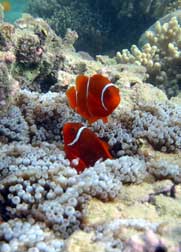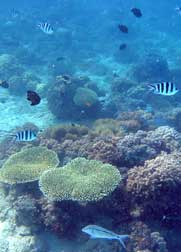



 |  |  |
Coral Reefs and Climate Change Dr Kenneth E. Clifton, Professor of Biology Lewis and Clark College, Portland Oregon | ||
 |
photos by Ken Clifton |
It has been my great fortune to have studied coral reefs and their inhabitants for more than 30 years.
Mounting scientific evidence makes it clear that human-caused increases in atmospheric carbon dioxide represent an immediate and dangerous threat to these remarkable ecosystems.
This web-page provides information on corals and how environmental changes that accompany CO2 accumulations may lead to their decline and eventual extinction.
I urge you to support efforts to curb green-house gas emissions in every way possible to help preserve coral reefs and other natural resources.
An evaluation of the potential impacts of global climate change upon coral reefs requires an understanding of three things:
2) The predicted environmental changes associated with climate change that are relevant to coral reefs
3) The predicted response of corals to such environmental changes
What are corals?
Corals are small and simple invertebrates of the phylum "Cnidaria".
Reef building corals are Anthozoans that live as colonies of "polyps" in shallow marine waters.
Corals build an external, calcium carbonate "skeleton" to support and protect their fragile bodies.
This building would not be possible without the additional energy supplied by symbiotic algae (zooxanthellae) that reside within the outer part of the coral polyp.
So.... corals indirectly need sunlight to survive
These algae are what give corals their vibrant colors (coral polyps, by themselves, are transparent)
The loss of zooxanthellae from living coral polyps is known as "coral bleaching". Without zooxanthellae, corals eventually die.
Corals feed by extending their tentacles out to capture suspended food particles from the water.
Coral reproduction occurs by cloning, fragmentation, and synchronized spawning events.
So then... what are coral reefs?
Coral reefs are the result of skeleton building by thousands of colonial coral polyps over long periods of time.
Coral reef ecosystems are very important to many organisms, including humans
They are an important source of food and pharmaceuticals.
They buffer shoreline populations from wave action and erosion and an important source of building materials
They indirectly help deplete C02 levels (to build their skeletons)
They provide aesthetic and recreational opportunities for pleasure.
2) Predicted environmental changes associated with global climate change that are relevant to coral reefs.
A report in the journal Science (2007) provides an excellent review of the effects of increasing atmospheric CO2 on the oceanic environment during the 20th century. These include:
A rise in average sea temperature
A rise in sea level
A rise in the acidity of seawater and associated decline in carbonate ion concentrations
The rate of change in these environmental shifts is 2-3 orders of magnitude greater than rates seen in the last 420,000 years, reducing the likelihood that corals can adapt sufficiently.
Other environmental consequences predicted from climate change models:
Storms are predicted to become more severe and unpredictable.
Increased runoff from floods may increase silting on corals and reduce water clarity.
3) Predicted responses of corals to environmental changes induced by climate change
Increasing temperature leads to the loss of algal symbionts (bleaching)...
Outcome: Coral growth ceases and corals eventually die.
Increasing depth (as sea-level rises) reduces light levels (remember, corals need sunlight) and may reduce the availability of food.
Outcome: Reduced growth increases the risk of mortality or damage.
Changing environmental conditions may cause physiological stress, that leads to disease.
Outcome: Epidemics of disease may spread rapidly with high rates of mortality and reduced reproductive output.
Ecological feedback loops may lead to dramatic, long-term shifts, from coral dominated to algal dominated reefscapes.
Outcome: Increases in algal cover limit the ability of new corals to settle and grow. Fewer corals are present to replace older colonies as they die or are damaged.
Unpredictable and severe storm activity will damage reefs. This effect is magnified if reef structure is tweaked from acidification.
Outcome: Shallow reefs exposed to high wave energy will suffer damage, increasing mortality and reducing reproduction.
4) Predicted responses of corals to environmental changes induced by increasing concentrations of Carbon in seawater
Acidification and reduced carbonate concentrations affect the ability of corals to build their skeletons...
Outcome: Reefs shrink as erosion of reef material exceeds corals' ability to build reef matrix.
The bottom line: As atmospheric and oceanic CO2 levels climb, the negative impacts on coral reefs will increase.
Coral dominated communities
375 ppm of CO2, + 1°C
Algal/Coral mixed communities
450-500 ppm of CO2, + 2°C
Non-coral communities
>500 ppm of CO2, + > 3°C
Conclusion:
At CO2 levels of 500 ppm (at the lower range of CO2 concentrations predicted by the Intergovernmental Panel on Climate Change), coral reefs will essentially vanish as an ecosystem, replaced by rubble and algae. Given current trends, this will happen within the next 70 - 100 years.
What needs to happen to protect coral reefs from such a dismal fate?
1) stabilize and reduce greenhouse gas emissions
2) conserve reef habitat and protect them from over-exploitation
3) reduce pollution (sediment, chemicals, solid waste, etc.) of marine waters
4) educate about the threats to coral reefs and the need for action now!Please do what you can to ensure that coral reefs do not become a thing of the past!
In addition to the links above, here are some other sites with relevant information about corals, reefs, and climate change.
A report from the Pew Center on Global Climate Change (2004)
Please feel free to contact me with questions or comments.
This webpage was originally created in 2008 as part of "Focus the Nation", a national teach-in to address issues and solutions realting to climate change.
Last revision: 1/26/17